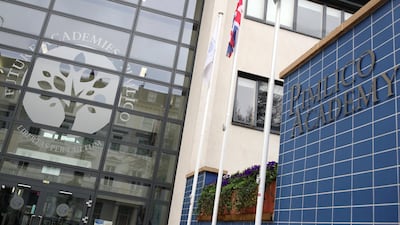British schools are being urged to rewrite guidelines on hair and uniform policies to provide a fair and inclusive environment for the student body.
The perils of getting it wrong were highlighted by the situation at a central London school were hundreds of students protested against classroom discrimination, leading to a crisis that led to headmaster Daniel Smith agreeing to step down on May 31.
The protest at the Pimlico Academy drew nationwide attention after pupils opposed changes to uniform rules, the curriculum and the placing of the national flag outside the school.
The protests led to rewriting of school rules by officials who subsequently warned the 1,200 pupils, aged 11 to 18, that they could face expulsion if there was a repeat of the demonstrations.
Campaigners said the protests highlighted a deeper malaise in British education in a system marked by cases of racism, xenophobia and general intolerance, according to the report by think tank Runnymede.
It called for an overhaul of the curriculum, policies and the overwhelmingly white workforce after claiming that racism was "deeply embedded" in schools.
About 93 per cent of head teachers and 86 per cent of all teachers are white British, according to the latest government figures. White Britons make up 76 per cent of the working population.
“Much clearer anti-racism policies are needed to institutionally embed a culture of anti-racism in schools,” said the report, which was based on interviews with teachers in Manchester, north-west England.
“Seemingly neutral school policies – like uniform and hair policies – should be reviewed from an anti-racist perspective to ensure that BME students are not systematically disadvantaged.”
Hundreds of pupils walked out of classes at Pimlico Academy on March 31 over a series of complaints, including an edict that hijabs worn by students “should not be too colourful”.
Black students were angered by a policy under head teacher Daniel Smith that banned hairstyles that "block the view of others".
Students left the school sign plastered with stickers that read “Decolonise education” and “Fight racism and fascism”.
After the protests, Mr Smith wrote to parents in an attempt to defuse the row.
A stipulation that headscarves should completely cover the hair was removed, along with a demand that they should be “conventional and understated in style”.
Phone camera footage showed hundreds of pupils taking part in the protest and chanting, “We want change” inspired by the Black Lives Matter protests. Police kept a low-key presence on the school grounds.
Situated a short walk from the Houses of Parliament, the school is a high-profile focus of efforts to improve the life chances of pupils from disadvantaged backgrounds.
Mr Smith is employed by Future Academies, one of about 1,500 trusts that run government-funded but independent schools.
First opened by the Labour government in 2000, they are championed and expanded by the ruling Conservative government allowing for greater freedom with fewer restrictions on curriculum and hours. By 2019, nearly three quarters of students aged 11-18 were taught in academies.
Future Academies is headed by John Nash, a former Conservative education minister with responsibility for academies, and with his wife has donated more than £300,000 ($424,423) to the Conservative Party.
Mr Smith was appointed as principal in September 2020 after 13 years of teaching, according to his LinkedIn profile. He imposed strict guidelines on pupils’ behaviour and dress at previous schools where he worked, according to reports.
Since the controversy at Pimlico, Future Academies brought in Michael Wilshaw, a former chief inspector of schools, as a mentor. Mr Wilshaw is known as Dirty Harry after forging his reputation as a head teacher in some of the country's toughest schools.
But the appointment went down badly with staff – more than 30 teachers handed in their resignations for the end of the school year, according to unions. They passed a vote of no-confidence in the head and are discussing further industrial action.
They cited an unacceptable management style, failures to communicate properly with staff and unreasonable workload.


